CB Patel, Editor of Asian Voice, one of the leading publications of the Asian diasporas in the UK, rarely ever speaks about himself. We were fortunate enough to catch up with the 82-year-old dynamic, humorous, pragmatic entrepreneur who gives us an upbeat view of the future in an exclusive interview.
You’ve been a big Modi supporter. What are your reactions to Modi’s re-election and the impact that will have on Indo-UK relations in a post-Brexit era within the next few years?
I’ve supported every Indian government and oppositions on issues. For example, when Rajiv Gandhi came in the field, I wrote articles very positively, such as an article in New Life – “Rise and rise of Rajiv Gandhi”. However when I went to India, on the Indian government’s invitation in 1984, I realised that Mr Clean is not that clean. It was already in print.
Similarly, with Modi, in the past I have raised critical questions too. I genuinely feel that Dr Manmohan Singh is a very honest, professional, economic minister, a very good person who got sucked up in UPA 2 where he had to tolerate corruptions.
I am a Modi supporter because I firmly believe that he is the best option present to India in the present circumstances. If you look at the comment in Asian Voice, we have mentioned that Modi has done a fantastic job in winning the elections. But the proof of the pudding is the celebrations of his victory throughout the world. He has made several promises but it is for us to see whether that’s been performed or not. That is where the support is coming from.
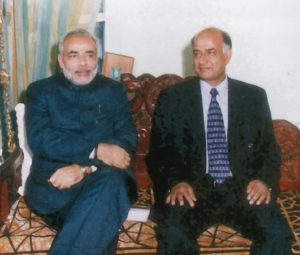 There are a few things in Modi that I admire. I’ve known Modi for more than twenty years. I’ve read his books and poems in Gujarati when he wrote them in 1974-75. When a young person writes poetry or stories, his true inner-self is reflected. I think he has good reasons and intentions. He is not a corrupt man, he is also an able administrator. He can lead the people, that is what I like about him. He does not say “do this” he prefers saying “let’s do this”.
There are a few things in Modi that I admire. I’ve known Modi for more than twenty years. I’ve read his books and poems in Gujarati when he wrote them in 1974-75. When a young person writes poetry or stories, his true inner-self is reflected. I think he has good reasons and intentions. He is not a corrupt man, he is also an able administrator. He can lead the people, that is what I like about him. He does not say “do this” he prefers saying “let’s do this”.
Non corruption is Modi’s strongest card. I remember his training of young IAS officers in Gujarat in 2002. He tried to energise them, inspire them and give them proper training. As I saw him, he was an efficient, credible person and as a leader he has an emotional link with people. He has a fantastic way to talk, to address meetings – even personal meetings.
I am positive about Indo-British relations under his governance. Modi knows how to meet people. He has established first class credentials in the City of London. He has changed the banking system in India, gotten rid of non-performing assets, everything has become online. That way relations will be strong because India needs Britain’s expertise and if Britain leaves the EU, they can do better business with India because of Modi’s popularity and personal relations with the British politicians, academics, and most importantly, the British Indian diaspora.
This diaspora has a very important dimension in any relationship.
Asian Voice has redefined the way British Asian publications are looked at these days. Do you feel like a trail-blazer doing that?
I don’t think so. I came into print media, not trained as a journalist. My father inspired me and I am a very keen reader… so I cannot claim to redefine or be a trailblazer. I am just very fortunate (chuckles). These are very serious statements. I am very fortunate that at the age of 82, I still work ten hours every day. I do it not for the profits, but because I enjoy it. I believe that in a small way, I am doing some service to my community through knowledge sharing.
We don’t take adverts from many businesses like cigarettes, alcohol, and meat so we forgo a certain amount of money. I work so hard because I need to work hard. I genuinely believe that I am very fortunate in this publishing business.
You’ve diversified your business over the years. Was this always going to be your plan?
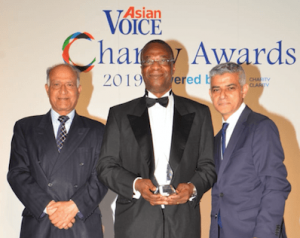 It was the need of the hour to diversify. I studied Law and joined a company to sell Mutual Funds and suchlike part-time. I was fortunate. My boss, a former army officer, taught me how to work ethically and I succeeded. Eventually I realised that it wasn’t totally satisfying. So I went into media and I established a large and hopefully credible publishing house. I owe this to my colleagues, without them I am nothing, I can’t do anything. Maybe I am fortunate to have met the right people at the right time and embark on the right projects.
It was the need of the hour to diversify. I studied Law and joined a company to sell Mutual Funds and suchlike part-time. I was fortunate. My boss, a former army officer, taught me how to work ethically and I succeeded. Eventually I realised that it wasn’t totally satisfying. So I went into media and I established a large and hopefully credible publishing house. I owe this to my colleagues, without them I am nothing, I can’t do anything. Maybe I am fortunate to have met the right people at the right time and embark on the right projects.
There are never any plans for diversification. For the next twenty years, if I am alive, I will do the same thing as I am doing now. Nothing more, nothing less.
There have been quite a few new entrants in the British Asian media scenario. How do you see these new ideas, people, establishments – as exciting or a threat?
Most Asian media in radio, print, or broadcasting came with a lot of hope and confidence. Some succeeded, some did not succeed. But everybody came with some ideas or ambitions. Many years back, Ashoke Advani came in but could not sustain, so had to close down. MJ Akbar’s Asian Age had to be disposed.
The media business is full of challenges. We have about 20,000 paid subscribers. To retain the trust and confidence of your readers and advertisers it’s not only what you print, but how you serve people all round. I believe that in every business there are some extra advantages and serious threats also. It will all depend upon me, on how I manage these. If my paper is not good, or if we are self-centred or arrogant, then we don’t deserve to survive.
Ask George (CEO of Asian Voice) or Rupanjana (Managing Editor of Asian Voice) and they’ll tell you that we are here to serve. I like to be as humble as possible.
Asian Voice has a strong presence in India. You have roots in Kenya as well. Is that where your next global footprint will be? What is the British Asian market like there?
We have people reading Asian Voice in India, but we have no plan to go there or anywhere in the world. Only a few hundred copies are sent to Kenya. They are subscribers or it’s complimentary. And thousands read the online version. But it is more as a service. They should know about British Asians in London.
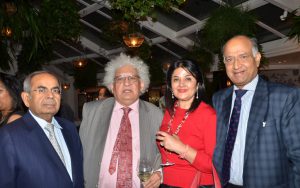
I went to Tanzania when I was 23 and lived there for six and a half years. For the last 52 years I have been in the UK. I owe so much to London. I am proud to be Indian also. I am 51% Indian, 49% I belong to the UK. I want to live in London till 2048.
Any provider of goods and services should never take the market for granted. There will be ups and downs and challenges, but I am very optimistic about Asian Voice, Gujarat Samachar, and ABPL.
How do your Asian values define the way you run the company?
Human beings cannot stand erect in life without the pillars of values and self-responsibility. One key value is our sense of shame. I belong to the generation where it was always clear to us that we should not engage in anything that is shameful. Like stealing, being corrupt, crime, disrespecting our elders, etc. Second is “gun-swikaar” gratefulness. If you help me, I should never forget that Smita helped me when I was in difficulty. Ungratefulness is a very negative thing in my view. These are two Indian values that are the most important in my mind.
Our sense of shame and our sense of gratitude. If you betray the confidence and contribution of those who helped you, then that is not Indian values. Never kick the ladder that helped you to climb.
You are over 80 and yet so energetic, alert, and full of life. What is your secret?
I made a covenant that I will try to live as long as I can, as healthily as I can, and do something as worthwhile as I can. I am a vegetarian, I work very hard, and I look after my body and my mind with diet, lifestyle, walking, rest, breathing exercises, yoga, reading, and relaxing. All these things are for my self interest. It’s my covenant with Mother Earth or destiny that I should live a long and healthy life. I feel privileged that I am able to work. I attend so many events, and that’s because I enjoy it. God has been partial to me. I feel that I get preferential treatment from the big boss up there. Now I know that I am allowed to live here till 2048 as long as I do something worthwhile.
What is your mantra in life? Something to leave the readers by…
Keep on working as long as you can, for the good of everyone and keep a partnership to serve the majority of the people.
At 82, money is not my priority. I’ve invested wisely, I have my peace of mind, my kids have grown up…
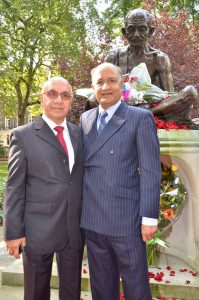
I am very optimistic about the Asian race and India particularly. I’ve said in my columns that it was never this great before. All over mankind, in health, wealth, and happiness, we are a very privileged kind in the world and India will come back as a shinning example of a multi-faith, multi-cultural developed economy.
India is a big democracy, whereas China is big economically, but not a democracy. However, to run India with so many contradictions we’ve still done very well, given that we’re a country with many surprises. Among all the countries that gained independence in Africa, Latin America, Asia, why has India remained one? 600 million people have voted. Can you imagine? This is because of Indian values. I am genuinely very impressed about our youth also. We’ve never had it so good and the best is yet to happen.
Smita is a multi-cultural freelance journalist, writer, and filmmaker based out of the US, London, Hong Kong, and India. Global Indian Stories is her brain-child. Created to chronicle diaspora stories written by Indians of all age groups, from different walks of life across the globe, Smita makes sure that the platform remains inclusive and positive.
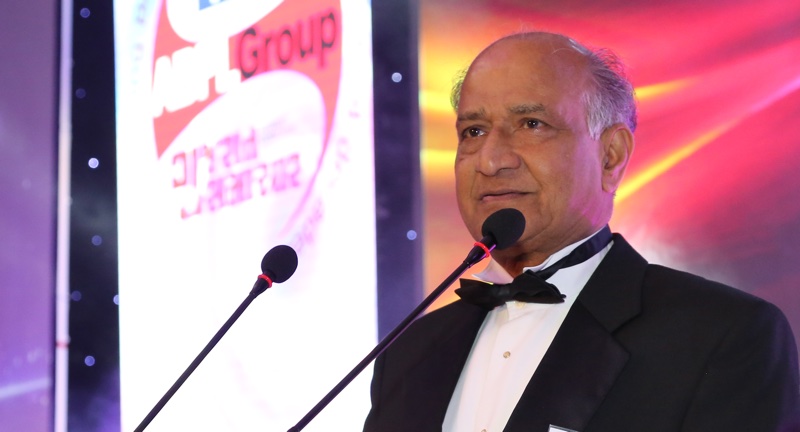

![Powerful Pride documentary Legendary Children [All Of Them Queer] streaming very soon](https://globalindianstories.org/wp-content/uploads/2025/06/Legendary-streaming-release-featured-238x178.jpg)



![Powerful Pride documentary Legendary Children [All Of Them Queer] streaming very soon](https://globalindianstories.org/wp-content/uploads/2025/06/Legendary-streaming-release-featured-100x75.jpg)

